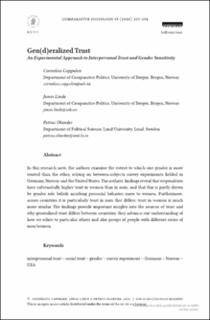Gen(d)eralized Trust: An Experimental Approach to Interpersonal Trust and Gender Sensitivity
Journal article, Peer reviewed
Published version

Åpne
Permanent lenke
https://hdl.handle.net/11250/2763435Utgivelsesdato
2020Metadata
Vis full innførselSamlinger
Sammendrag
In this research note, the authors examine the extent to which one gender is more trusted than the other, relying on between-subjects survey experiments fielded in Germany, Norway and the United States. The authors’ findings reveal that respondents have substantially higher trust in women than in men, and that this is partly driven by gender role beliefs ascribing prosocial behavior more to women. Furthermore, across countries it is particularly trust in men that differs; trust in women is much more similar. The findings provide important insights into the sources of trust and why generalized trust differs between countries; they advance our understanding of how we relate to particular others and also groups of people with different ratios of men/women.
